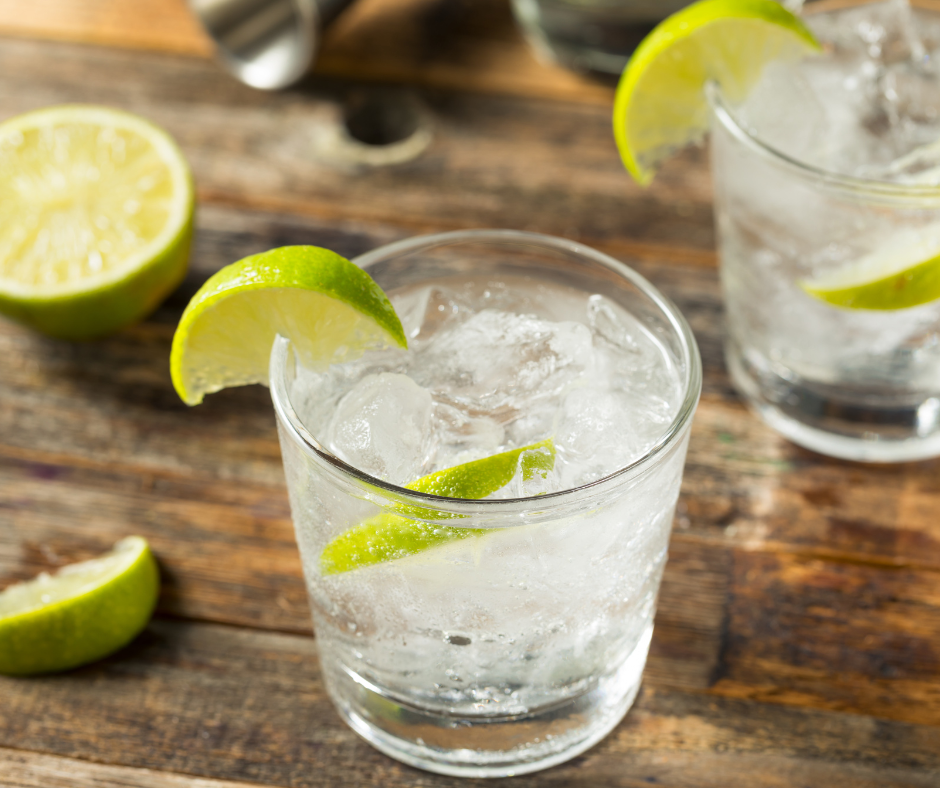Introduction
Tonic water: Medicinal Elixir or Refreshing Mixer? If you’ve ever wondered, ‘Is Tonic Water Good For You?‘ you’re not alone. In this article, we’ll explore the origins and composition of tonic water to help you understand its potential benefits and drawbacks.
A Brief Overview Of Tonic Water
Tonic water is a carbonated beverage known for its distinctive bitter taste. Originally developed as a tonic to prevent and treat malaria, it quickly became popular as a mixer for cocktails such as the classic Gin and Tonic. Today, tonic water is enjoyed alone or combined with alcoholic beverages to create refreshing drinks.
Explanation Of Its Composition And Primary Ingredient, Quinine
Tonic water gets its unique flavor from quinine, a bitter compound extracted from the bark of the cinchona tree. Quinine has historically been used to combat malaria due to its antimalarial properties. However, the concentration of quinine in modern tonic water is significantly lower than the doses used for medicinal purposes.
While consuming tonic water in moderation is generally safe, it’s essential to note that excessive consumption may lead to negative effects. Quinine can cause side effects such as nausea, ringing in the ears, and diarrhea in some individuals. It may also interact negatively with certain medications, so it’s advisable to consult a healthcare professional if you have any concerns.
Benefits and potential drawbacks of tonic water:
- Relieving muscle cramps: Some people find that drinking tonic water can provide relief from muscle cramps due to the presence of quinine. However, more research is needed to fully understand its effectiveness in this regard.
- Hydration: Like any other beverage, tonic water can contribute to your daily fluid intake and help keep you hydrated. However, it’s important to remember that tonic water contains added sugars and calories, so moderation is key.
- Anti-inflammatory properties: Quinine has been found to have anti-inflammatory effects in some studies. These properties may help with conditions such as arthritis or inflammatory bowel disease. However, further research is necessary to understand these benefits’ extent fully.
- Potential risks: The main concern with tonic water is its quinine content. As mentioned earlier, excessive consumption of quinine can lead to adverse effects. Additionally, the high sugar content in some tonic water brands may not be suitable for individuals with diabetes or those following a low-sugar diet.
In conclusion, while tonic water can provide a refreshing beverage option and may have potential health benefits, consuming it in moderation is essential. If you have any specific health concerns or are taking medications, it’s advisable to consult with a healthcare professional before adding tonic water to your diet.
The Health Benefits Of Tonic Water
Discussion Of Quinine’s Historical Use For The Treatment Of Malaria
Tonic water, with its unique bitter taste, has a rich history that dates back to the 17th century. It was originally developed to administer quinine, a natural extract from the bark of the cinchona tree, which was used to treat malaria. Quinine has long been recognized for its antimalarial properties and was even used by British soldiers in colonial times to prevent and treat the disease. While the use of quinine for malaria treatment has declined with the development of more effective drugs, tonic water continues to be enjoyed as a refreshing mixer. It is still produced with a small amount of quinine for its distinct flavor.
Explanation Of Quinine’s Potential Health Benefits In Tonic Water
While the amount of quinine in tonic water is significantly lower compared to what was historically used to treat malaria, it still contains a trace amount that may have some potential health benefits. Quinine has been shown to have anti-inflammatory and pain-relieving properties and is often used in the treatment of muscle cramps and restless leg syndrome. Additionally, quinine has been suggested to have antimalarial, antipyretic, and analgesic effects.
Although the beneficial effects of quinine are recognized, it is important to note that drinking tonic water alone is not a substitute for medical treatment, and individuals should always consult their healthcare provider for advice on managing specific health conditions.
In addition to its quinine content, tonic water typically contains carbonated water, sugar, and flavors such as lemon or lime. It is important to be mindful of the sugar content in tonic water, as it can be relatively high. Opting for sugar-free or low-sugar versions can be a healthier choice.
Furthermore, it is worth mentioning that despite tonic water’s potential health benefits, it should be consumed in moderation, especially for individuals with certain health conditions. Excessive consumption of tonic water may lead to adverse effects such as gastrointestinal upset, allergic reactions, or interactions with certain medications. As always, it is advisable to consult with a healthcare professional before making any significant changes to your diet or lifestyle.
So, Is Tonic Water Good For You? While tonic water may have some potential health benefits due to its quinine content, it should be consumed in moderation and as part of a balanced diet. It is important to prioritize good health practices, such as maintaining a nutritious diet, regular exercise, and seeking appropriate medical advice, rather than relying solely on tonic water for health benefits.
The Risks And Side Effects Of Tonic Water
Tonic water, a popular mixer for alcoholic beverages and a favorite among gin lovers, has a distinct bitter taste that adds a refreshing twist to any drink. But what about its potential health benefits and risks?
Insight Into The Potential Side Effects Of Consuming Quinine In Large Doses
Quinine is a key ingredient in tonic water and has historically been used to treat malaria. However, consuming large amounts of quinine can adversely affect the body.
- Cinchonism: Quinine can cause a condition known as cinchonism, characterized by symptoms such as headache, nausea, vomiting, tinnitus (ringing in the ears), and even vision disturbances. These side effects are more likely when consuming excessive tonic water or using quinine supplements.
- Allergic reactions: Some individuals may be allergic to quinine, and consuming tonic water can trigger allergic reactions such as hives, itching, or difficulty breathing. Before consuming tonic water, knowing about any allergies or sensitivities is important.
- Interaction with medications: Quinine in tonic water can interact with certain medications, including blood thinners, antibiotics, and drugs used to treat heart conditions. These interactions may lead to adverse effects or decrease the effectiveness of the medications. It is essential to consult a healthcare professional before consuming tonic water if you are taking any medications.
Explanation Of Why Using Tonic Water To Treat Medical Conditions Is Not Recommended
While tonic water contains quinine, which has medicinal properties, it is not recommended to use it as a treatment for medical conditions.
- Low quinine content: The amount of quinine in tonic water is significantly lower than that used for medicinal purposes. It would be impractical and potentially dangerous to rely on tonic water alone for therapeutic benefits.
- Lack of regulation: Tonic water is a beverage, not a regulated medication. Its quinine content may vary between brands and batches, making it unreliable for consistent dosages.
- Possible harm: Using tonic water as a self-medication may lead to improper dosing or neglect of proper medical treatment. Consulting a healthcare professional for appropriate medical advice and treatments is crucial.
Is Tonic Water Good For You?
So, Is Tonic Water Good For You? Tonic water can be enjoyed as a refreshing mixer in moderation, but it is essential to be aware of potential risks and side effects. Consuming large amounts of tonic water can lead to cinchonism and allergic reactions and may interact with certain medications. Additionally, relying on tonic water for medical treatment is not recommended, as it contains a lower quinine content and is not regulated like medications. Consulting a healthcare professional for concerns or medical needs is always best.
Tonic Water As A Mixer And Culinary Ingredient
Tonic water is often associated with mixing cocktails, particularly the classic gin and tonic. However, its uses extend beyond being a refreshing mixer. This bubbly beverage infused with quinine has a distinctive bitter taste that can add a unique flavor profile to various culinary creations.
Discussion Of The Various Uses Of Tonic Water Beyond Mixing With Spirits
While tonic water is commonly used to mix spirits, it can also be a refreshing beverage. The distinctive flavor and effervescence of tonic water make it a popular choice for those looking for something different from the usual soft drinks. Tonic water can be enjoyed over ice with a squeeze of lime or lemon for a simple and satisfying thirst quencher.
In addition to being a standalone drink, tonic water can be used as an ingredient to enhance the flavors of other beverages. It can be added to herbal teas, fruit juices, and even sparkling water to give them a subtle bitterness and complexity. Experimenting with different ratios of tonic water to other ingredients can create unique and refreshing mocktails.
Examples Of How Tonic Water Is Used In Cooking And Desserts
Tonic water is not limited to beverages; it can also be utilized in various culinary creations. The bitter and slightly sweet taste of tonic water can complement certain dishes, adding depth and complexity to the overall flavor.
One popular use of tonic water in cooking is as a marinade for meats, particularly chicken and pork. The tonic water’s quinine helps tenderize the meat while adding a subtle bitterness that balances well with savory seasonings. Tonic water can be combined with herbs, spices, and citrus for a flavorful marinade that infuses the meat with unique taste sensations.
In desserts, tonic water can be incorporated into recipes for a delightful twist. It can be a flavoring agent in gelatin desserts, sorbets, and popsicles, lending a slightly bitter note that balances the sweetness. The carbonation of tonic water can also create light and airy mousses or add a refreshing fizz to fruit salads.
With its distinctive flavor profile, tonic water has become a versatile ingredient in the culinary world, offering creative possibilities beyond just being a mixer. From refreshing beverages to flavorful marinades and desserts, tonic water’s bitter and effervescent qualities can elevate your culinary creations to new heights.
In conclusion, tonic water is undeniably a refreshing mixer, but its uses extend beyond cocktails. It can be enjoyed independently, used as an ingredient in mocktails, and even incorporated into various dishes and desserts. The bitter taste and effervescence of tonic water bring a unique flavor profile, making it a versatile companion in the culinary world. So, the next time you reach for a tonic water bottle, consider exploring its potential beyond the glass.
FAQ: Is Tonic Water Good For You? – Tonic Water: Medicinal Elixir or Refreshing Mixer?
Q: Is tonic water good for you?
A: While tonic water may have some potential health benefits, it is important to consider the overall nutritional content. Tonic water typically contains added sugar, which can be a concern if consumed in large quantities.
Q: What is the difference between tonic water and other carbonated waters?
A: Tonic water differs from other carbonated waters such as club soda, seltzer, and sparkling water. Tonic water contains quinine, a bitter alkaloid that was originally used to treat malaria. It is also often sweetened and flavored with fruit extracts.
Q: Can tonic water be considered a medicinal elixir?
A: Historically, tonic water was used as a medicinal drink due to its quinine content. Quinine was believed to have therapeutic properties against malaria. However, modern tonic water typically contains a much lower amount of quinine and is primarily used as a mixer in cocktails.
Q: Are there any health benefits associated with drinking tonic water?
A: Tonic water may offer some health benefits, such as providing hydration and potentially easing muscle cramps due to its quinine content. However, these benefits are usually attributed to the higher quinine levels in prescription medications rather than the lower amounts in tonic water.
Q: What should I consider when consuming tonic water?
A: It’s important to be mindful of the sugar content in tonic water, as excessive sugar intake can have negative health effects. If you are monitoring your sugar intake or have any specific health concerns, limiting your tonic water consumption may be wise.
Q: What are some alternative carbonated water choices?
A: If you’re looking for a refreshing and low-calorie option, club soda, seltzer, and sparkling water can be great choices. These carbonated waters typically have no added sugar and can be enjoyed plain or mixed with a squeeze of lemon or lime for added flavor.
Q: Can diet tonic water be a healthier option?
A: Unfortunately, diet tonic water is not a straightforward healthier alternative. While it may have reduced sugar content, it often contains artificial sweeteners, which may have their own potential health implications. When making choices, it’s important to consider your individual dietary preferences and health needs.
Q: How can I make a healthier carbonated drink at home?
A: If you want to enjoy a refreshing and healthy alternative, try mixing club soda with a splash of lemon juice and a pinch of salt. This combination can provide a bubbly drink that is both hydrating and flavorful, especially on a hot summer day.
Conclusion
Now you know ‘Is Tonic Water Good For You?’. After exploring the topic of tonic water and its potential health benefits, as well as considering its sugar content and the effects of quinine, we can draw a few conclusions.
Summary Of The Key Points Discussed In The Blog Post
- Origins and ingredients: Tonic water was originally developed as a medicine to treat malaria, and it contains water, carbonation, sweeteners, and quinine.
- Quinine and health benefits: Quinine, the main active ingredient in tonic water, has been traditionally used to treat malaria and has potential benefits as an anti-inflammatory and muscle relaxant. However, the amount of quinine in tonic water is relatively low to provide therapeutic effects.
- Sugar content: Tonic water typically contains added sweeteners, contributing to its taste and increasing its sugar content. This can concern individuals watching their sugar intake or having specific dietary restrictions.
- Hydration alternative: Tonic water can be a refreshing and alternative choice to sugary sodas or alcoholic mixers because of its lower sugar content and unique flavor profile.
Overall Perspective On Whether Tonic Water Is Good For You Or Not
While tonic water has potential health benefits and can be a healthier alternative to sugary beverages, its high sugar content should be considered. Moderation is key when consuming tonic water, especially if you are watching your sugar intake or have dietary restrictions.
It’s important to note that tonic water should not be used as a replacement for medical treatment or prescribed medication. If you are seeking to address specific health concerns, it is always best to consult with a healthcare professional.
Enjoying tonic water as a refreshing mixer or occasional beverage can be part of a balanced lifestyle. If you are concerned about the sugar content, sugar-free or low-sugar options are available. As with any food or drink, being mindful of portion sizes and considering your health needs is essential.
So, the next time you reach for a gin and tonic or simply fancy a flavorful drink, you can decide whether it’s the right choice. Cheers to enjoying tonic water responsibly and in moderation!

Deb Carlson at Crosslake Coffee: Join Deb at Crosslake Coffee for a delightful blend of community, caffeine, and creativity. Discover the cozy ambiance and warm hospitality that make this local coffee shop a beloved gathering spot. From expertly crafted espresso drinks to mouthwatering pastries, Deb invites you to savor every sip and bite. Stay connected with the latest updates on specials, events, and live music performances by following Deb Carlson at Crosslake Coffee on social media. Embrace the vibrant online community and share your love for great coffee and good company with fellow enthusiasts. Don’t miss out on a moment of the Crosslake Coffee experience – connect with Deb on social media today.



